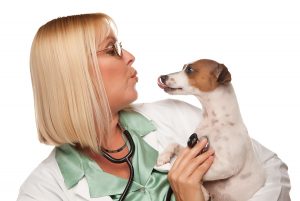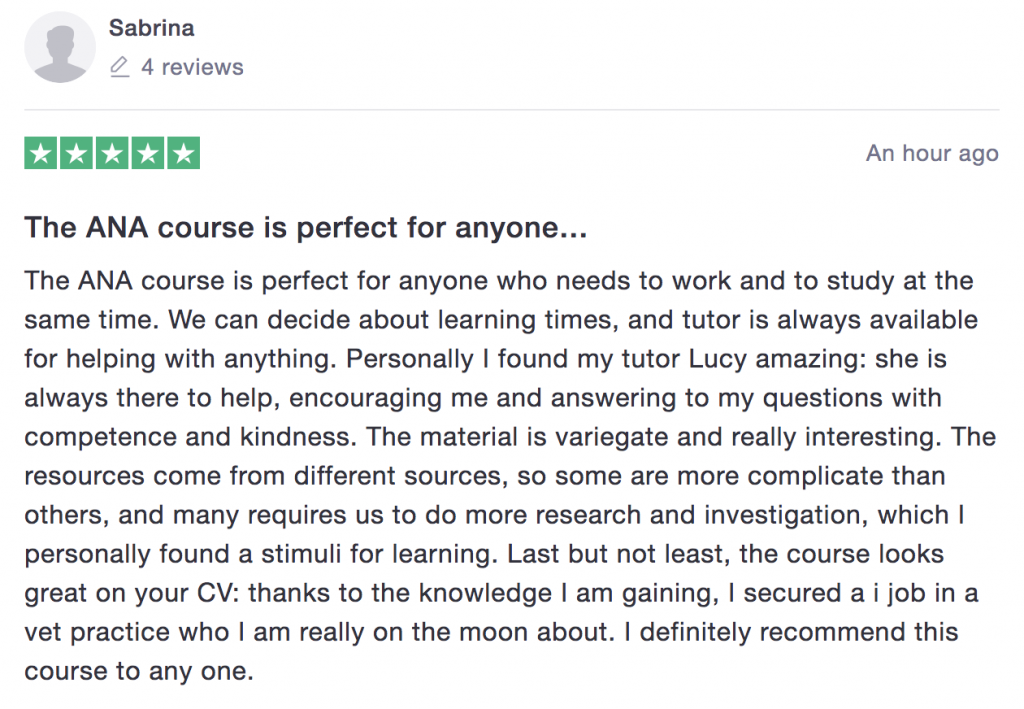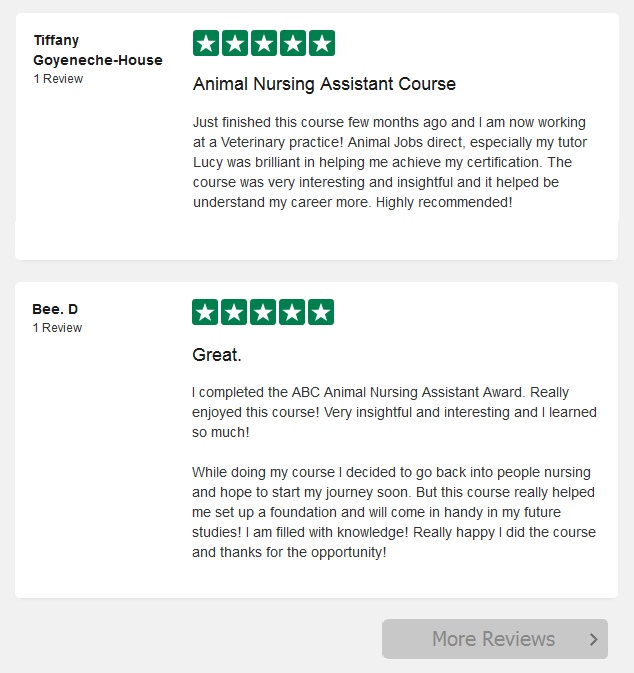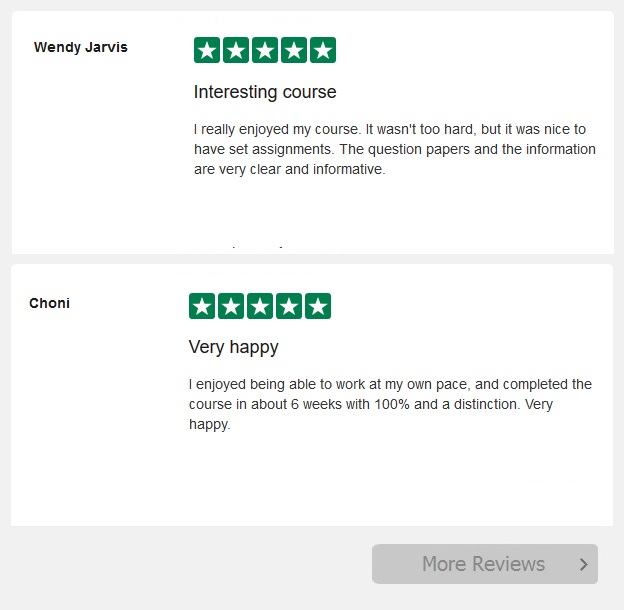Course Summary
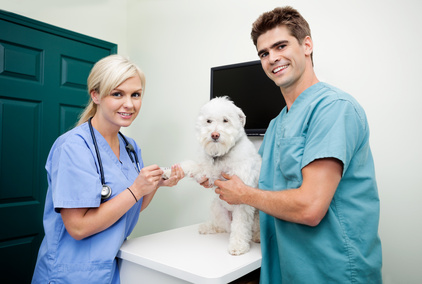
On this course, those who enrol will learn practical skills for caring for animals. Additionally, they will develop and grow their skills in customer services and retail which are both necessary when working as a veterinary nurse.
The Level 2 Diploma for Veterinary Nursing Assistants is held in high regard in veterinary practices, providing an alternative route to GCSE’s and enhanced opportunities to progress to the Royal College of Veterinary Surgeons Level 3 Diploma in Veterinary Nursing.
This course aims to facilitate learners’ further progression for a career in animal care or Veterinary Nursing, based within a Veterinary Practice.
It provides learners with the information required to play a valuable support role to qualified veterinary staff and to assist owners in the correct management of their companion animals.
It is a theory and practically-based qualification that has the aim of preparing a student for the rigour and level of demand required for the Vet Nursing Course.
What You Will Learn
You will learn a range of skills and develop your knowledge in a variety of different areas. This includes discovering how to manage and maintain accommodation for animals, including how to feed and water animals to ensure that they get the care they need.
Learn how to provide basic treatments that animals often need including typical healthcare treatments. Gain practical experience with a range of routine procedures to make sure that you are fully equipped to help animals in your care.
It is crucial that those aiming to work in veterinary medicine understand the anatomy and physiology of animals. There are a range of reasons why this information will be necessary. Through the modules, you will learn how to handle and restrain animals the correct way based on their anatomy and physiology. It’s important that animals are restrained without injury.
Infection is a major concern whenever an animal is brought into a veterinary practice with an injury. Learn about the principles of infection control and how to manage an infection.
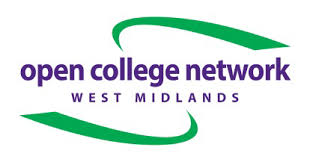
Level 2 Diploma for Veterinary Nursing Assistants
Unit 1
Principles of Animal Health
This unit explores the terminology commonly used in veterinary practice and how this relates to a range of species. Students will learn about the signs of normal and abnormal health in dogs, cats, rabbits, guinea pigs, hamsters, lizards, snakes and tortoises and how to ensure good health and carry out routine health checks.
Unit 2
Principles of First Aid
This unit explores the principles of first aid and companion animal veterinary emergencies. Students will learn the importance of communication within the veterinary team and how to support a client during the emergency. This unit also includes information about the legislation involved in first aid treatment, how to recognise a veterinary emergency, the information required when dealing with an emergency call and how to treat common injuries.
Unit 3
Principles of Hygiene, Cleaning and Disinfection in an Animal Care Environment
High standards of cleaning and hygiene in an animal nursing environment are essential in order to prevent of the spread of disease and infection. Students will learn about infectious diseases commonly seen in domestic mammals and reptiles and the importance of maintaining a clean environment. Learn the difference between disinfection and sterilisation, understand the safe use of cleaning and disinfection chemicals and learn how to follow a cleaning protocol with a thorough understanding of areas to be cleaned and their level of infection risk. This unit also contains information about the equipment sterilised in a veterinary practice, waste disposal methods, how to reduce waste in an animal nursing environment.
Unit 4
Reception and Administrative Duties in an Animal Care Environment
This unit explores the structure of a veterinary practice and students will learn about the roles and duties of each role.
Students will learn about:
*The services provided in a veterinary practice including the referral process and the promotion and marketing of veterinary services.
*The professional standards and requirements in a veterinary environment
*The importance of health and safety in the veterinary workplace.
*How to deal with various clients including, different methods of client communication, registering a new client, making appointments, answering phones, taking payments, dealing with difficult or sensitive situations and the importance of client confidentiality.
Unit 5
Euthanasia and Bereavement
Students will gain an understanding of the reasons for euthanasia and the circumstances when euthanasia may be required. Students will learn how the euthanasia process is carried out and the options for the disposal of a deceased pet. Students will gain an understanding of the stages of grief and be able to recognise each of the stages.
Unit 6
Principles of Body Language and Behaviour
Correct handling and restraint techniques during veterinary procedures is essential in order to reduce stress for domestic mammals and reptiles. Students will learn how to recognise and manage stress and fear when handling a variety of companion animals.
Unit 7
Veterinary Instruments
Students will learn how to identify the instruments used for routine surgeries such as castration, spay and tumour removal. This unit also covers the correct care, cleaning and storage of veterinary instruments as well as packaging and sterilisation.
Unit 8
Veterinary Medicines in an Animal Care Environment
This unit explores the workings of the veterinary pharmacy, including stock control, safe and secure storage of medicines, waste disposal and the importance of adherence to protocols.
Students will learn about veterinary medicines and gain an understanding of each stage of the medicines management pathway, including prescribing, dispensing and administration.
Unit 9
British Wildlife
Veterinary staff frequently deal with various injured or sick wildlife. Students will learn about the most commonly treated British wildlife including garden birds, hedgehogs, rabbits, badgers, foxes and deer.
Gain an understanding of the obligations to treat wildlife and the limitations to this treatment. Students will learn about the options available for further treatment and rehabilitation of wildlife if treatment is beyond the expertise of general practice.
Unit 10
Practical Animal Handling and Restraint
Practical placement required – organise your own or let us organise one for you!
Unit 11
Practical Animal Care
Practical placement required – organise your own or let us organise one for you!
The Next Step
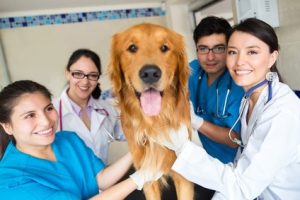
Those who have successfully completed the Level 2 Diploma for Veterinary Nursing Assistants are suited to work in many animal care environments from pet shop to animal charity. These careers can be incredibly fulfilling and will be perfect for anyone who wants to work with animals.
Opportunities Are Wide Open
This Ofqual regulated qualification is the perfect entry point providing both practical experience and theory for those eager to further their career as a veterinary nurse.
Learners who achieve the Level 2 Diploma for Veterinary Nursing Assistants and who have also attained Functional Skills/Key Skills at Level 2 in English/Communication and Mathematics/Application of Number, or the equivalent proxy qualifications, may progress onto the RCVS Level 3 Diploma in Veterinary Nursing.
If, at the end of the course, the learner decides that veterinary nursing is not the career that they wish to progress to, they will still have gained valuable regulated training. This will enable them to work within other areas of veterinary practice such as veterinary kennels/wards and veterinary reception. Their experience will also allow progression in other sectors of the animal industry, such as pet stores, boarding kennels or animal charities.
The Level 2 Diploma for Veterinary Nursing Assistants is a regulated qualification recognised by Ofqual.
Entry Requirements:
There are no specific academic requirements for entry onto this course. You must be 16 years or over, an animal lover and be able to read and write English.
It would be advantageous if you have some previous experience in a Veterinary practice or hospital (no matter how short) prior to enrolling on the qualification, however this is not essential.
You do not need to have secured a placement ahead of enrolling on the course. If you are already working or volunteering in a Veterinary practice, it does not need to be an RCVS training practice.
This qualification includes information about:
- small animal body language and behaviour
- handling and restraint (fear free methods)
- administration/ reception duties
- monitoring patients
- hygiene, cleaning and disinfection (to include zoonotic and transmissible diseases)
- instrument recognition
- first aid (and triage of patients)
- pharmacy
- bereavement and euthanasia
- british wildlife
- health checking and knowing normal/ abnormal signs of health
- health and safety/ legislation
- terminology/ anatomical direction
- practical animal care – feeding, cleaning, health checking
- practical handling and restraint
Information About Practical Placements
This course includes a mandatory placement to provide evidence of practical skills. The placement must be within a registered Veterinary Practice, or an animal establishment that has an element of veterinary care.
You are free to arrange this yourself, but if you prefer, we can arrange this for you for an additional fee.
We are pleased to offer placements with Abbey House Vets – a leading veterinary practice in Leeds and a respected name in West Yorkshire veterinary care. Their highly trained and caring teams of vets, nurses and support staff are proud of the standard of care they have provided to pet owners in Leeds and surrounding areas for over 40 years. The clinic is situated in Batley and has operating facilities so many day procedures can be carried out on site.
During your placement you will have the opportunity to gain experience in:
- Handling and moving a variety of species
- Assisting in a health check
- Cleaning and preparing appropriate accommodation for different species
- Providing an appropriate diet
Should this interest you, add the course placement to your basket when purchasing this course.
Frequently Asked Questions:
Who can do the course?
A good, working standard of English and mathematics is required. There are no specific academic requirements for entry onto this course. You must be 16 years or over, an animal lover and be able to read and write English.
It would be advantageous if you have some previous experience in a Veterinary practice or hospital (no matter how short) prior to enrolling on the qualification, however this is not essential.
How long do I have to complete the course?
You need to be able to complete the course within 24 months of enrolment
Do I have to have a practical placement to enrol on this course?
You do not need to have secured a placement ahead of enrolling on the course. If you are already working or volunteering in a Veterinary practice, it does not need to be an RCVS training practice. If you don’t have a placement by the time you enrol, you are free to arrange one yourself. Though if you prefer, we can arrange this for you for an additional fee.
How is the course designed, delivered and assessed?
The course is designed primarily, to be a self-study, distance learning course with tutor support to guide and support you through the learning and materials. The materials contain internet resources that have been examined for quality, content and access that are relevant to the topics and subject matter in the different units.
Are there any examinations
There are no examinations for the Level 2 Diploma for Animal Nursing Assistants as such but there are assessments at the end of each unit and students are required to build a portfolio of evidence of learning and understanding according to assessments set out in the course materials. Internal moderation of your portfolio is carried out by your tutor at Animal Jobs Direct and then moderated externally.
How long can I expect to be studying?
Each unit of this qualification contains a certain number of Guided Learning Hours (GLH) to give an indication of how long you can expect to be studying and preparing for any one unit’s assessment. Although the GLH of any unit may seem small (please see the specification above), you need to take into account the research and reading before attempting the assessments.
*You will have access to the course for 18 months only. You can purchase course extensions.
We offer a selection of accredited and employer recognised courses specifically designed for careers working with animals.
If you have any questions about our courses, please contact us.
We’ve assisted many people to achieve their goal to work with animals. Read more about our 5-star reviews and student success stories.
Gain relevant training to achieve your goal to work with animals.


